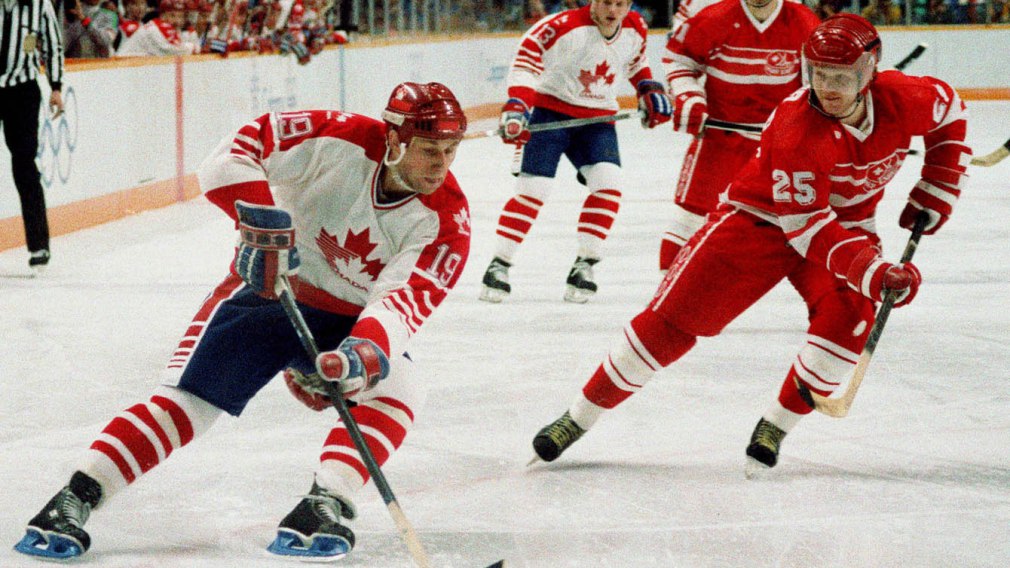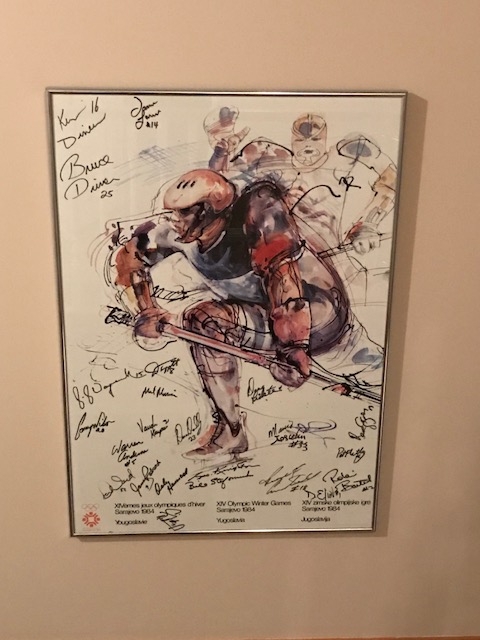
Vaughn Karpan (#19) competes against Russia at the 1988 Calgary Winter Olympics. //Photo from the Canadian Olympic Committee.
No Olympics, hockey career, without U of M
He’s scouted some of the most recognized faces in the NHL for the Montreal Canadiens, Phoenix Coyotes, and Vegas Golden Knights.
But long before he began his career off the ice, Vaughn Karpan [BA/85] was making a name for himself on the ice at the U of M’s Max Bell Centre.
Back in 1982, Karpan was a winger and captain of the Bison men’s hockey team, totaling 98 goals in his three-year run. Coach Wayne Fleming [CertEd/73, BPE/73] named him as one of the best college players in Canada, and that praise took him to the international stage.
In the 1984 Sarajevo and 1988 Calgary Winter Olympics, Karpan played for team Canada in men’s hockey.
UM Today caught up with Karpan, who’s now Director of Player Personnel with the Vegas Golden Knights, to talk about his Olympic experience and how the Bisons got him there.
UM Today: CAN YOU DESCRIBE YOUR OVERALL OLYMPIC EXPERIENCE?
Karpan: My first Winter Olympics was a bit surreal. After checking into your room, you headed off to the Team Canada headquarters to pick up your official clothing for the opening ceremonies. That was when it hit me that I was actually in the Olympics. You walk into that stadium with all the other athletes and you instantly realize that you are now on a world stage (and a long way from my hometown of The Pas, Manitoba).
The athletes’ village was neat. Our building was like an apartment with four rooms on each floor and each of us had a roommate. We had downhill skiers from Africa staying in our building. I remember standing outside with other athletes watching Canadian Gaétan Boucher skate to a gold medal in speed skating, and I saw John Denver walking around the village one day before he played a concert for the athletes.
One of the things with hockey is that you played on the first day of the Olympics and every second day through the end. Most of the other athletes perform over a course of two to three days and then have a chance to socialize. We never got that as hockey players.
DID ANYTHING SURPRISE YOU?
I don’t know if any one thing surprised me. What was really fascinating however, was the instant camaraderie with the other athletes on the Canadian team.
WHEN YOU WERE IN SARAJEVO, WHAT DID YOU LEARN ABOUT THE COUNTRY?
Ironically, I knew quite a bit about it before going. My dad’s parents were Croatian immigrants who came to Canada from Yugoslavia in 1929. My grandmother told me to be careful because Sarajevo had typically been a place where many different nationalities, like Serbs, Croats, Macedonians and gypsies would meet up and it could be dangerous in some parts of the city.
The economy was weak. I remember going to a restaurant for dinner and having a full course meal for only $2 CDN at that time.
BEING IN A NEW COUNTRY WITH SO MANY ATHLETES FROM DIFFERENT PLACES MUST HAVE CHANGED YOUR VIEW OF THE WORLD.
For me, it was the beginning of a life-long path of travel to Europe involving hockey. You learn to be patient; things don’t always happen according to plan. You learn to adapt; to enjoy those things that are unique to the region or area that you are in. I had a bit of that already because of my grandparents and their neighbourhood in Flin Flon. I had a feel for the “old country” already and felt that I already knew these people.
WHAT’S YOUR BEST MEMORY FROM THE OLYMPICS?
My fondest memory is walking into the stadium for the opening ceremonies. I was fortunate enough to do it once in Sarajevo and once at home in Calgary.

Men’s hockey poster from the 1984 Sarajevo Winter Olympics, signed by Karpan and teammates. // Photo by Vaughn Karpan.
WHAT DID YOU BRING HOME WITH YOU?
I still have the blanket from my bed in the athletes’ village. We all took them. It has the official mascot on it and is now stored for safe keeping.
HOW DID THE U OF M SHAPE YOUR PATH TO THE OLYMPICS?
Quite simply put, without the U of M and Wayne Fleming in particular, there would not have been an Olympics for me. Wayne was my biggest supporter and got the most out of me as a player. Dr. John Finlay [PhD/68, LLD/90], the Dean of Arts at the time, gave me his endorsement to leave before the winter term began. I did not attend any classes, but was allowed to take my finals and had the support of an academic assistant. I became a better student after this, primarily because I did not want to betray the trust that these three people had put in me.
WHAT DO YOU WISH PEOPLE AT HOME KNEW ABOUT THE OLYMPICS?
The Olympics is much more than the two-week event. For me, particularly the second time around, it was the culmination of three years of focused work. I went to practice every day not knowing if I would be on the team the next day – the competition was that steep. Not everyone can medal – I finished fourth both times – but there is tremendous value in the journey.
DO YOU HAVE ANY ADVICE FOR OUR BISONS AND OTHER ATHLETES WHO STRIVE TO PARTICIPATE IN THE OLYMPICS?
My advice would be simple. Be prepared and focused for your event, but enjoy the goings on. Get to know other athletes in the village, get out and see other events if time allows. It will come and go quickly. You become part of a special group by being able to call yourself an “Olympian.” No one can take that away from you.
Three decades after Karpan’s last U of M game, the Bison men’s hockey team are gearing up for a post-season best-of-three series this weekend. Playoff tickets will be sold at the door for $12 (adults) while UM students and fans under 17 get in free.
For the schedule and ticket information, visit gobisons.ca.






